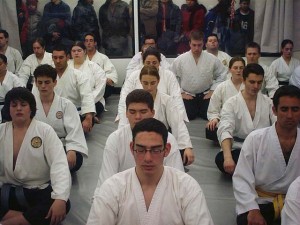“In theory there is no difference between theory and practice; in practice there is.” Yogi Berra
It’s all too easy to apply a dogmatic theory in a limited practical way that just confirms the prejudices enshrined in the theory. Useful theory needs to be informed by practice, and subject to adjustment in the light of the experience it brings.
The Middle Way offers a practical principle, justified only to the extent that it works. It is not possible to completely separate theory from practice, because every time we make a practical judgement we are making certain assumptions about how things are and what effect our actions are going to have. Improving our theoretical understanding, then, is itself a practical activity, as long as we are always judging theory in relation to experience rather than on the basis of metaphysics. One way of understanding metaphysics is that it is an attempt to be purely theoretical without genuine interaction with practice.
Every judgement we make about how we think things are depends on our mental states: particularly our desires and sense of what is meaningful. We can make a big contribution to more objective judgement indirectly, through the way we live our lives. We can improve our judgement, as well as possibly other things such as health, happiness and sense of meaning, through integrative practices
The Middle Way can offer a framework for a variety of established practices, as well as a focus for the development of new ones that are more closely related to Middle Way Philosophy. So far the areas of potential new practice consist of objectivity training and the Middle Way Meditation practice.
The Middle Way does not offer final, metaphysical goals for practice (such as the Buddhist concept of nirvana), but neither is it limited to the mere restoration of health, or worldly goals such as the improvement of performance in business.  Very often, various useful practices have had metaphysical ideas attached to them that we just have to gently detach in order to get a clear idea of why and how we are doing the practice.
Very often, various useful practices have had metaphysical ideas attached to them that we just have to gently detach in order to get a clear idea of why and how we are doing the practice.
Here follows a list of possible integrative practices that might be pursued in accordance with the Middle Way. The practices are classified roughly into whether they focus most on desire, meaning or belief – but these are not watertight distinctions, and some practices may support integration in all three areas.
Practices focusing mainly on desire
- recreation
- physical disciplines
- yoga
- tai chi
- martial arts
- dance
- meditation
- mindfulness of breathing meditation
- ‘just sitting’/zazen meditation
- MBSR (mindfulness-based stress reduction)
- psychotherapy
- emotional intelligence
- mediation techniques
- voluntary work
- political activity
Practices focusing mainly on meaning
- meditation
- loving-kindness meditation (metta bhavana)
- focusing
- thinking on the edge
- ritual
- humour
- the arts
- creative writing
- study/appreciation of literature
- music
- visual art
- study/ appreciation of visual art
- performing arts
- film
- education
- travel/ pilgrimage
Practices focusing mainly on belief
- reflection
- critical thinking
- Objectivity Training
- Middle Way meditation practice
- cognitive behavioural therapy
- autobiography
- philosophy
- religious studies
For a list of pages related to practices available on the site, please see the Practice page.
